Tacit and Explicit Knowledge in Strategic Human Resource Management
VerifiedAdded on 2022/10/15
|6
|1377
|259
Report
AI Summary
This report delves into the critical concepts of tacit and explicit knowledge within the framework of Strategic Human Resource Management (SHRM). It begins by defining and differentiating between explicit knowledge, which is easily articulated, codified, and shared, and tacit knowledge, which is rooted in personal experience, intuition, and is challenging to transfer. The report highlights the importance of both knowledge types in achieving organizational objectives, emphasizing that while explicit knowledge provides accessibility and ease of use, tacit knowledge offers a competitive advantage. The report also examines the role of SHRM in knowledge management, focusing on how organizations can convert tacit knowledge into explicit knowledge through training, development programs, peer communication, and informal learning environments. Finally, the report stresses the need for organizations to foster a culture that promotes learning and development by effectively utilizing both explicit and tacit knowledge to achieve their goals.
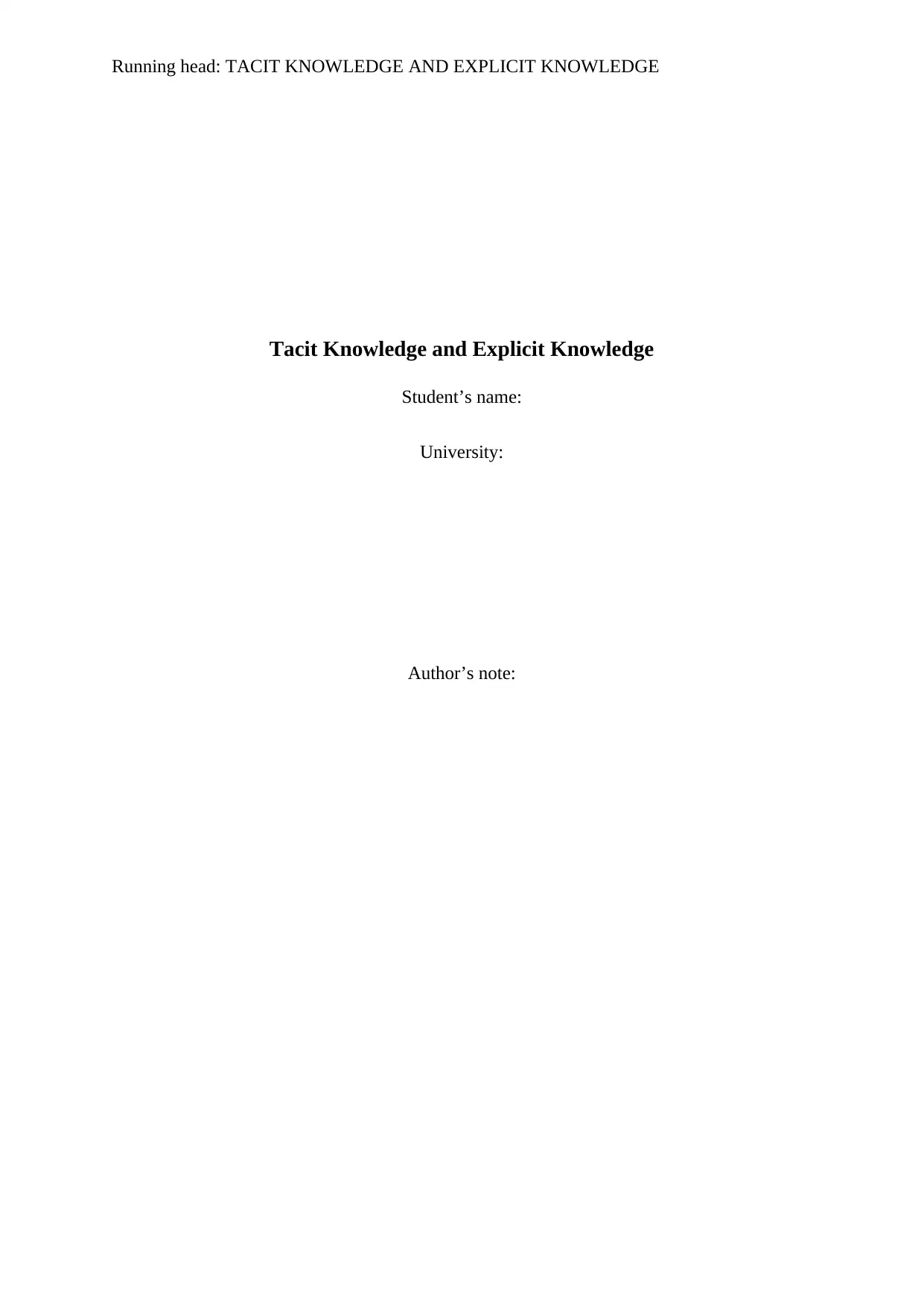
Running head: TACIT KNOWLEDGE AND EXPLICIT KNOWLEDGE
Tacit Knowledge and Explicit Knowledge
Student’s name:
University:
Author’s note:
Tacit Knowledge and Explicit Knowledge
Student’s name:
University:
Author’s note:
Paraphrase This Document
Need a fresh take? Get an instant paraphrase of this document with our AI Paraphraser
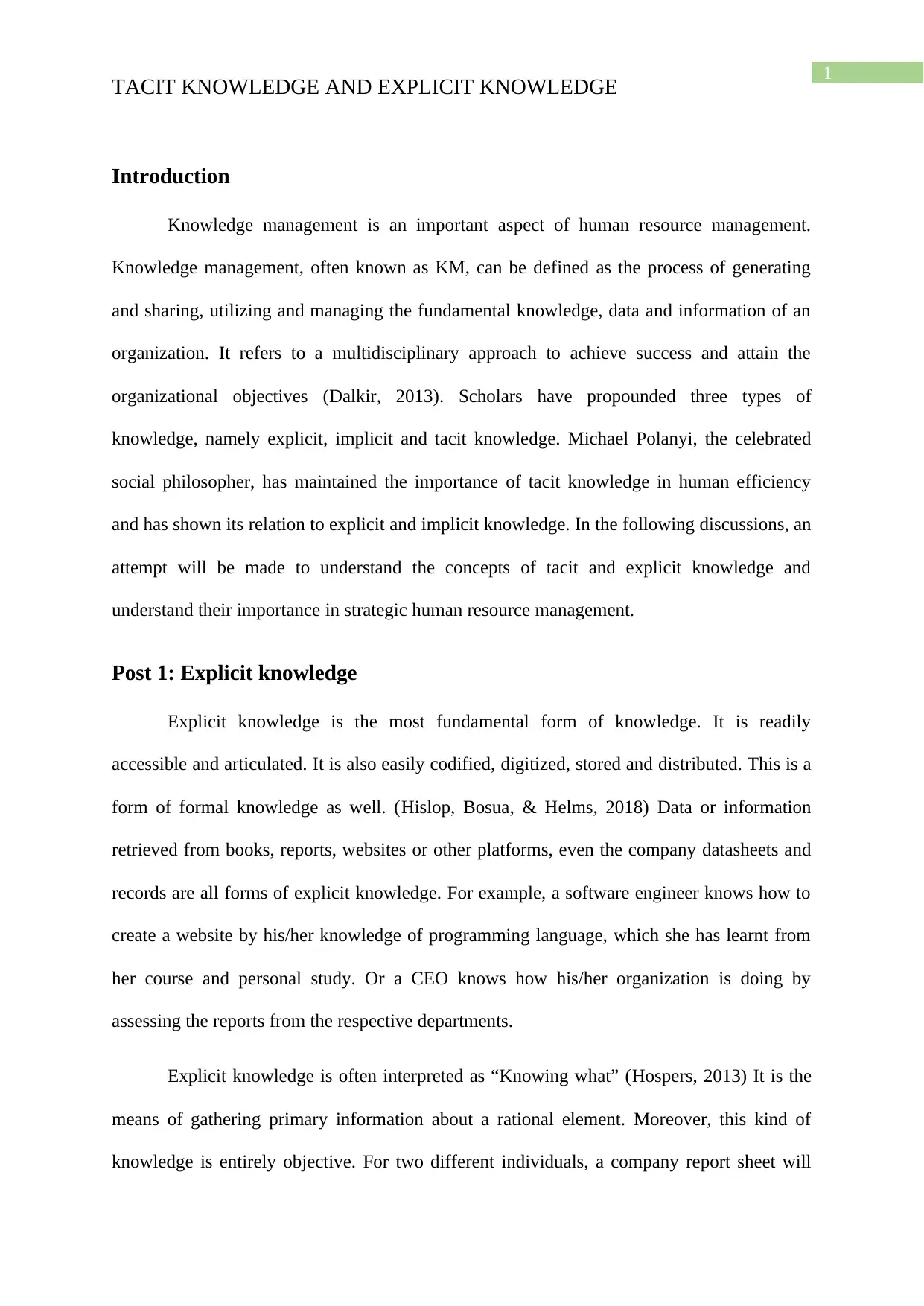
1
TACIT KNOWLEDGE AND EXPLICIT KNOWLEDGE
Introduction
Knowledge management is an important aspect of human resource management.
Knowledge management, often known as KM, can be defined as the process of generating
and sharing, utilizing and managing the fundamental knowledge, data and information of an
organization. It refers to a multidisciplinary approach to achieve success and attain the
organizational objectives (Dalkir, 2013). Scholars have propounded three types of
knowledge, namely explicit, implicit and tacit knowledge. Michael Polanyi, the celebrated
social philosopher, has maintained the importance of tacit knowledge in human efficiency
and has shown its relation to explicit and implicit knowledge. In the following discussions, an
attempt will be made to understand the concepts of tacit and explicit knowledge and
understand their importance in strategic human resource management.
Post 1: Explicit knowledge
Explicit knowledge is the most fundamental form of knowledge. It is readily
accessible and articulated. It is also easily codified, digitized, stored and distributed. This is a
form of formal knowledge as well. (Hislop, Bosua, & Helms, 2018) Data or information
retrieved from books, reports, websites or other platforms, even the company datasheets and
records are all forms of explicit knowledge. For example, a software engineer knows how to
create a website by his/her knowledge of programming language, which she has learnt from
her course and personal study. Or a CEO knows how his/her organization is doing by
assessing the reports from the respective departments.
Explicit knowledge is often interpreted as “Knowing what” (Hospers, 2013) It is the
means of gathering primary information about a rational element. Moreover, this kind of
knowledge is entirely objective. For two different individuals, a company report sheet will
TACIT KNOWLEDGE AND EXPLICIT KNOWLEDGE
Introduction
Knowledge management is an important aspect of human resource management.
Knowledge management, often known as KM, can be defined as the process of generating
and sharing, utilizing and managing the fundamental knowledge, data and information of an
organization. It refers to a multidisciplinary approach to achieve success and attain the
organizational objectives (Dalkir, 2013). Scholars have propounded three types of
knowledge, namely explicit, implicit and tacit knowledge. Michael Polanyi, the celebrated
social philosopher, has maintained the importance of tacit knowledge in human efficiency
and has shown its relation to explicit and implicit knowledge. In the following discussions, an
attempt will be made to understand the concepts of tacit and explicit knowledge and
understand their importance in strategic human resource management.
Post 1: Explicit knowledge
Explicit knowledge is the most fundamental form of knowledge. It is readily
accessible and articulated. It is also easily codified, digitized, stored and distributed. This is a
form of formal knowledge as well. (Hislop, Bosua, & Helms, 2018) Data or information
retrieved from books, reports, websites or other platforms, even the company datasheets and
records are all forms of explicit knowledge. For example, a software engineer knows how to
create a website by his/her knowledge of programming language, which she has learnt from
her course and personal study. Or a CEO knows how his/her organization is doing by
assessing the reports from the respective departments.
Explicit knowledge is often interpreted as “Knowing what” (Hospers, 2013) It is the
means of gathering primary information about a rational element. Moreover, this kind of
knowledge is entirely objective. For two different individuals, a company report sheet will
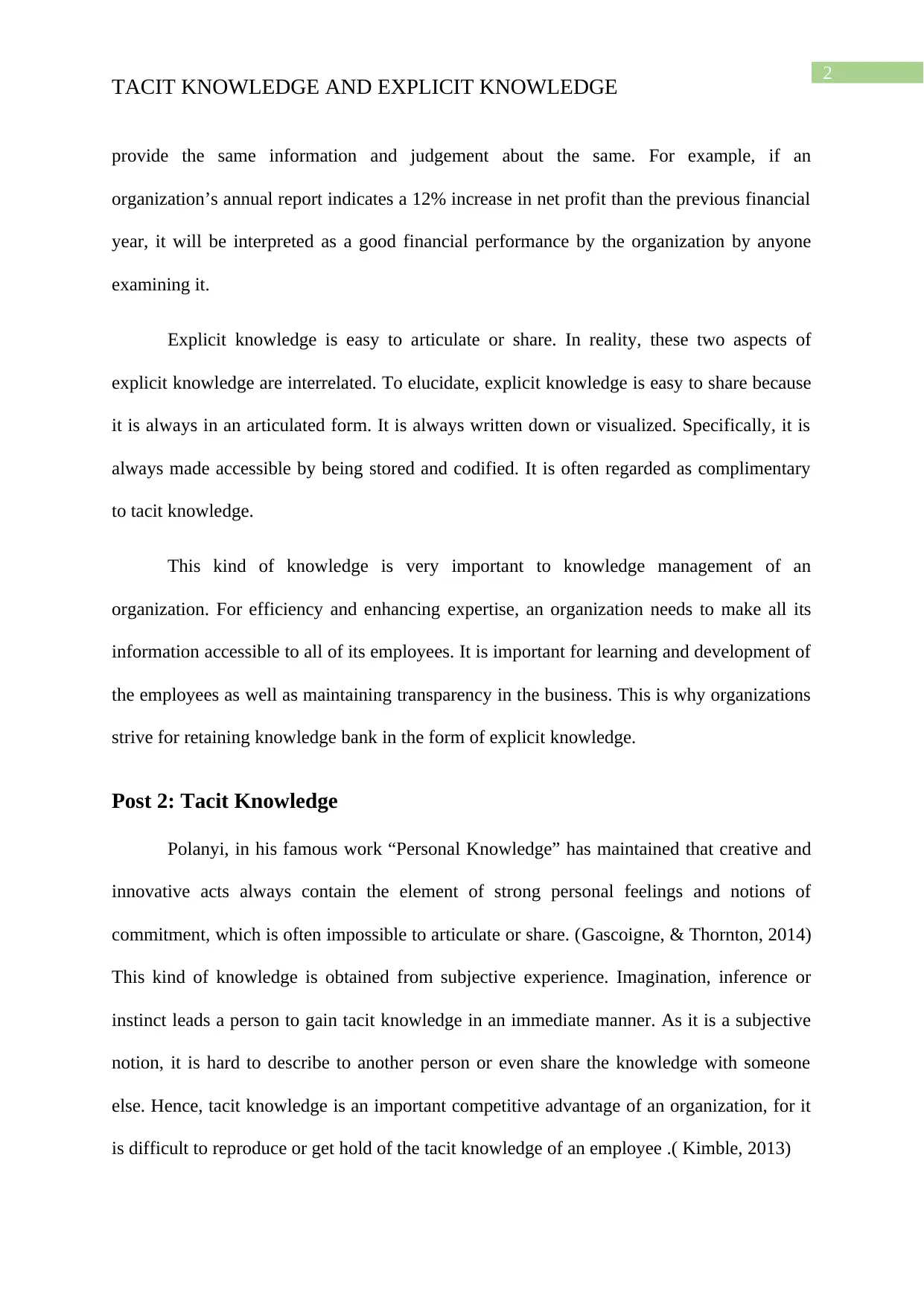
2
TACIT KNOWLEDGE AND EXPLICIT KNOWLEDGE
provide the same information and judgement about the same. For example, if an
organization’s annual report indicates a 12% increase in net profit than the previous financial
year, it will be interpreted as a good financial performance by the organization by anyone
examining it.
Explicit knowledge is easy to articulate or share. In reality, these two aspects of
explicit knowledge are interrelated. To elucidate, explicit knowledge is easy to share because
it is always in an articulated form. It is always written down or visualized. Specifically, it is
always made accessible by being stored and codified. It is often regarded as complimentary
to tacit knowledge.
This kind of knowledge is very important to knowledge management of an
organization. For efficiency and enhancing expertise, an organization needs to make all its
information accessible to all of its employees. It is important for learning and development of
the employees as well as maintaining transparency in the business. This is why organizations
strive for retaining knowledge bank in the form of explicit knowledge.
Post 2: Tacit Knowledge
Polanyi, in his famous work “Personal Knowledge” has maintained that creative and
innovative acts always contain the element of strong personal feelings and notions of
commitment, which is often impossible to articulate or share. (Gascoigne, & Thornton, 2014)
This kind of knowledge is obtained from subjective experience. Imagination, inference or
instinct leads a person to gain tacit knowledge in an immediate manner. As it is a subjective
notion, it is hard to describe to another person or even share the knowledge with someone
else. Hence, tacit knowledge is an important competitive advantage of an organization, for it
is difficult to reproduce or get hold of the tacit knowledge of an employee .( Kimble, 2013)
TACIT KNOWLEDGE AND EXPLICIT KNOWLEDGE
provide the same information and judgement about the same. For example, if an
organization’s annual report indicates a 12% increase in net profit than the previous financial
year, it will be interpreted as a good financial performance by the organization by anyone
examining it.
Explicit knowledge is easy to articulate or share. In reality, these two aspects of
explicit knowledge are interrelated. To elucidate, explicit knowledge is easy to share because
it is always in an articulated form. It is always written down or visualized. Specifically, it is
always made accessible by being stored and codified. It is often regarded as complimentary
to tacit knowledge.
This kind of knowledge is very important to knowledge management of an
organization. For efficiency and enhancing expertise, an organization needs to make all its
information accessible to all of its employees. It is important for learning and development of
the employees as well as maintaining transparency in the business. This is why organizations
strive for retaining knowledge bank in the form of explicit knowledge.
Post 2: Tacit Knowledge
Polanyi, in his famous work “Personal Knowledge” has maintained that creative and
innovative acts always contain the element of strong personal feelings and notions of
commitment, which is often impossible to articulate or share. (Gascoigne, & Thornton, 2014)
This kind of knowledge is obtained from subjective experience. Imagination, inference or
instinct leads a person to gain tacit knowledge in an immediate manner. As it is a subjective
notion, it is hard to describe to another person or even share the knowledge with someone
else. Hence, tacit knowledge is an important competitive advantage of an organization, for it
is difficult to reproduce or get hold of the tacit knowledge of an employee .( Kimble, 2013)
⊘ This is a preview!⊘
Do you want full access?
Subscribe today to unlock all pages.

Trusted by 1+ million students worldwide
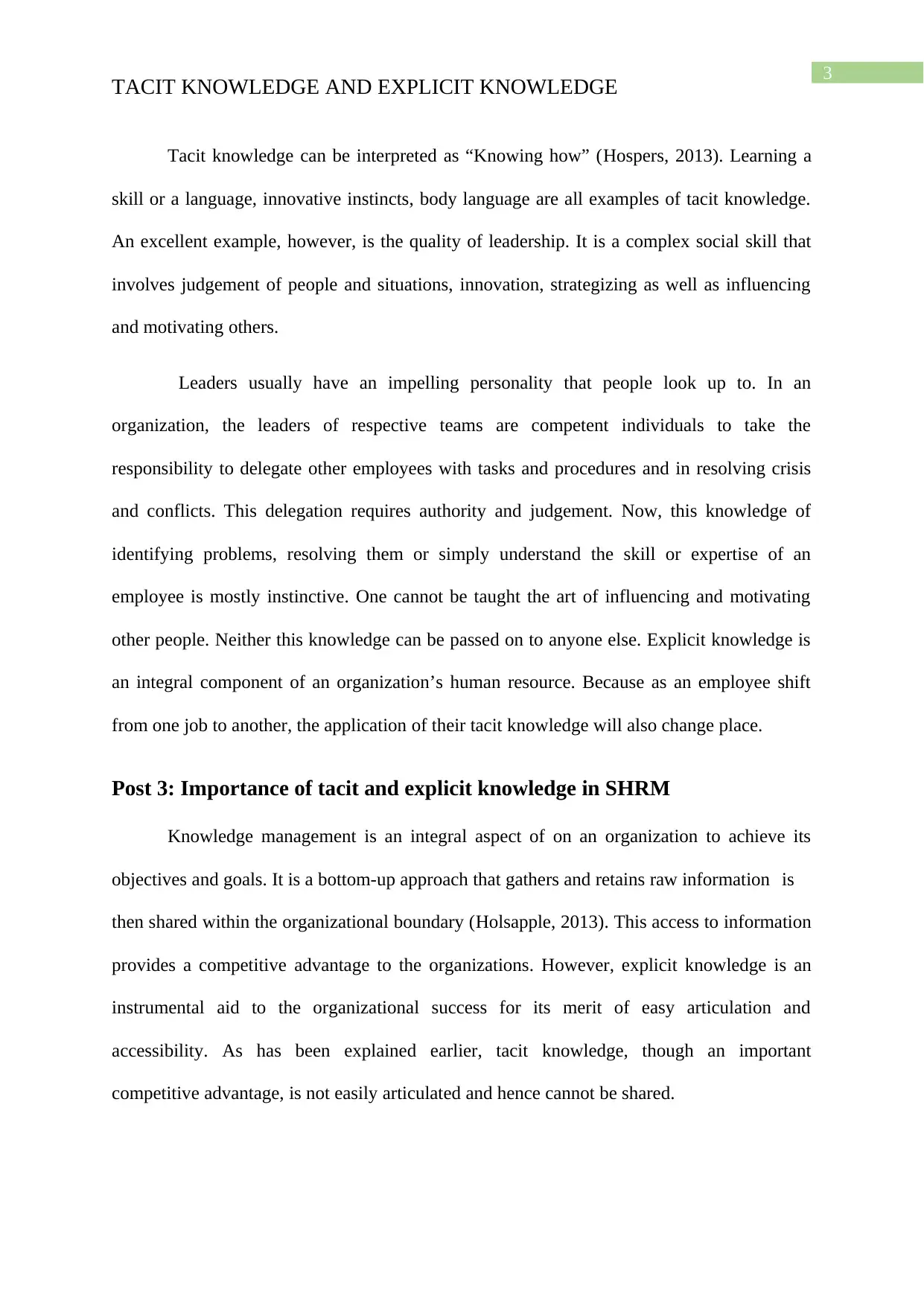
3
TACIT KNOWLEDGE AND EXPLICIT KNOWLEDGE
Tacit knowledge can be interpreted as “Knowing how” (Hospers, 2013). Learning a
skill or a language, innovative instincts, body language are all examples of tacit knowledge.
An excellent example, however, is the quality of leadership. It is a complex social skill that
involves judgement of people and situations, innovation, strategizing as well as influencing
and motivating others.
Leaders usually have an impelling personality that people look up to. In an
organization, the leaders of respective teams are competent individuals to take the
responsibility to delegate other employees with tasks and procedures and in resolving crisis
and conflicts. This delegation requires authority and judgement. Now, this knowledge of
identifying problems, resolving them or simply understand the skill or expertise of an
employee is mostly instinctive. One cannot be taught the art of influencing and motivating
other people. Neither this knowledge can be passed on to anyone else. Explicit knowledge is
an integral component of an organization’s human resource. Because as an employee shift
from one job to another, the application of their tacit knowledge will also change place.
Post 3: Importance of tacit and explicit knowledge in SHRM
Knowledge management is an integral aspect of on an organization to achieve its
objectives and goals. It is a bottom-up approach that gathers and retains raw information is
then shared within the organizational boundary (Holsapple, 2013). This access to information
provides a competitive advantage to the organizations. However, explicit knowledge is an
instrumental aid to the organizational success for its merit of easy articulation and
accessibility. As has been explained earlier, tacit knowledge, though an important
competitive advantage, is not easily articulated and hence cannot be shared.
TACIT KNOWLEDGE AND EXPLICIT KNOWLEDGE
Tacit knowledge can be interpreted as “Knowing how” (Hospers, 2013). Learning a
skill or a language, innovative instincts, body language are all examples of tacit knowledge.
An excellent example, however, is the quality of leadership. It is a complex social skill that
involves judgement of people and situations, innovation, strategizing as well as influencing
and motivating others.
Leaders usually have an impelling personality that people look up to. In an
organization, the leaders of respective teams are competent individuals to take the
responsibility to delegate other employees with tasks and procedures and in resolving crisis
and conflicts. This delegation requires authority and judgement. Now, this knowledge of
identifying problems, resolving them or simply understand the skill or expertise of an
employee is mostly instinctive. One cannot be taught the art of influencing and motivating
other people. Neither this knowledge can be passed on to anyone else. Explicit knowledge is
an integral component of an organization’s human resource. Because as an employee shift
from one job to another, the application of their tacit knowledge will also change place.
Post 3: Importance of tacit and explicit knowledge in SHRM
Knowledge management is an integral aspect of on an organization to achieve its
objectives and goals. It is a bottom-up approach that gathers and retains raw information is
then shared within the organizational boundary (Holsapple, 2013). This access to information
provides a competitive advantage to the organizations. However, explicit knowledge is an
instrumental aid to the organizational success for its merit of easy articulation and
accessibility. As has been explained earlier, tacit knowledge, though an important
competitive advantage, is not easily articulated and hence cannot be shared.
Paraphrase This Document
Need a fresh take? Get an instant paraphrase of this document with our AI Paraphraser
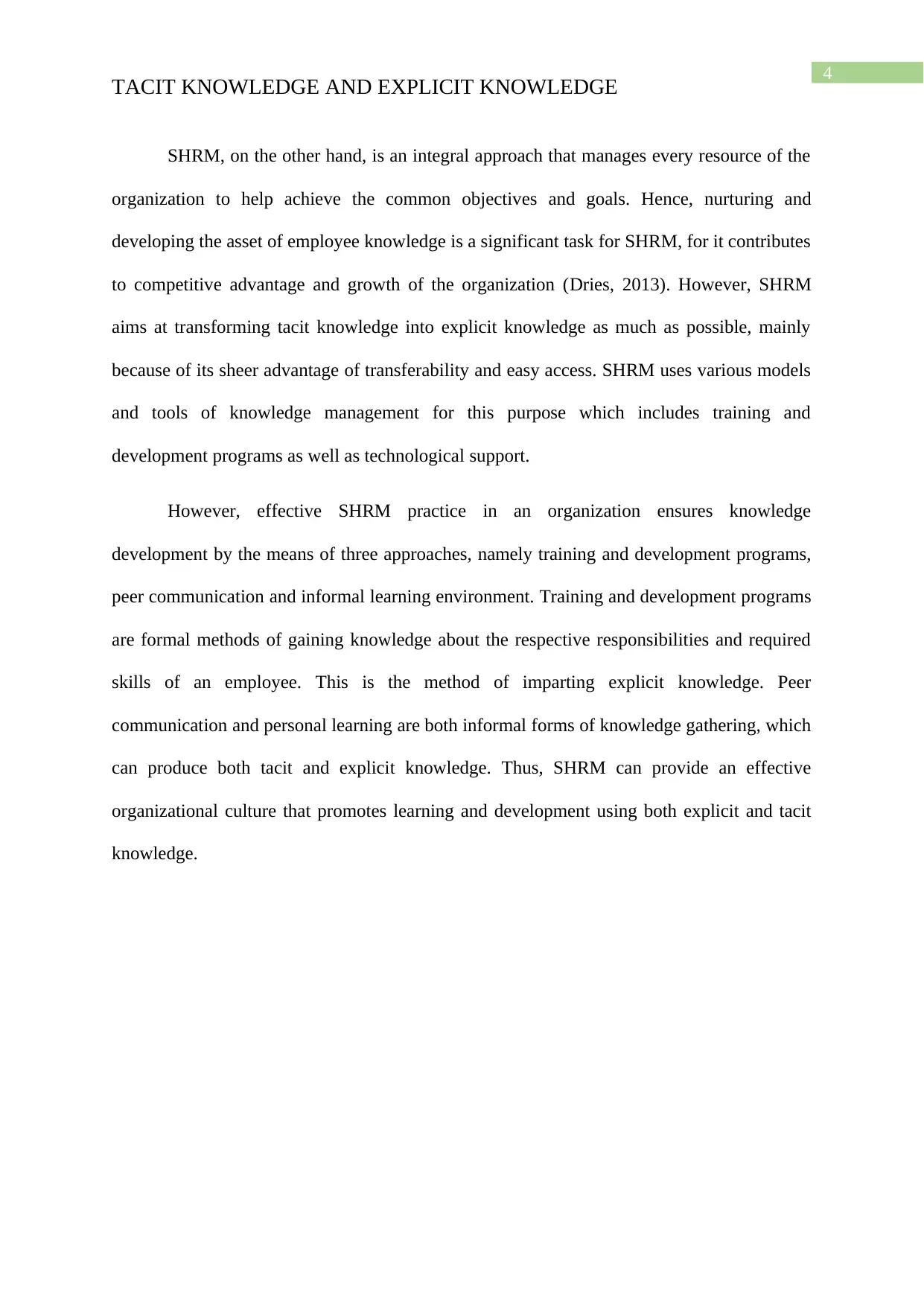
4
TACIT KNOWLEDGE AND EXPLICIT KNOWLEDGE
SHRM, on the other hand, is an integral approach that manages every resource of the
organization to help achieve the common objectives and goals. Hence, nurturing and
developing the asset of employee knowledge is a significant task for SHRM, for it contributes
to competitive advantage and growth of the organization (Dries, 2013). However, SHRM
aims at transforming tacit knowledge into explicit knowledge as much as possible, mainly
because of its sheer advantage of transferability and easy access. SHRM uses various models
and tools of knowledge management for this purpose which includes training and
development programs as well as technological support.
However, effective SHRM practice in an organization ensures knowledge
development by the means of three approaches, namely training and development programs,
peer communication and informal learning environment. Training and development programs
are formal methods of gaining knowledge about the respective responsibilities and required
skills of an employee. This is the method of imparting explicit knowledge. Peer
communication and personal learning are both informal forms of knowledge gathering, which
can produce both tacit and explicit knowledge. Thus, SHRM can provide an effective
organizational culture that promotes learning and development using both explicit and tacit
knowledge.
TACIT KNOWLEDGE AND EXPLICIT KNOWLEDGE
SHRM, on the other hand, is an integral approach that manages every resource of the
organization to help achieve the common objectives and goals. Hence, nurturing and
developing the asset of employee knowledge is a significant task for SHRM, for it contributes
to competitive advantage and growth of the organization (Dries, 2013). However, SHRM
aims at transforming tacit knowledge into explicit knowledge as much as possible, mainly
because of its sheer advantage of transferability and easy access. SHRM uses various models
and tools of knowledge management for this purpose which includes training and
development programs as well as technological support.
However, effective SHRM practice in an organization ensures knowledge
development by the means of three approaches, namely training and development programs,
peer communication and informal learning environment. Training and development programs
are formal methods of gaining knowledge about the respective responsibilities and required
skills of an employee. This is the method of imparting explicit knowledge. Peer
communication and personal learning are both informal forms of knowledge gathering, which
can produce both tacit and explicit knowledge. Thus, SHRM can provide an effective
organizational culture that promotes learning and development using both explicit and tacit
knowledge.
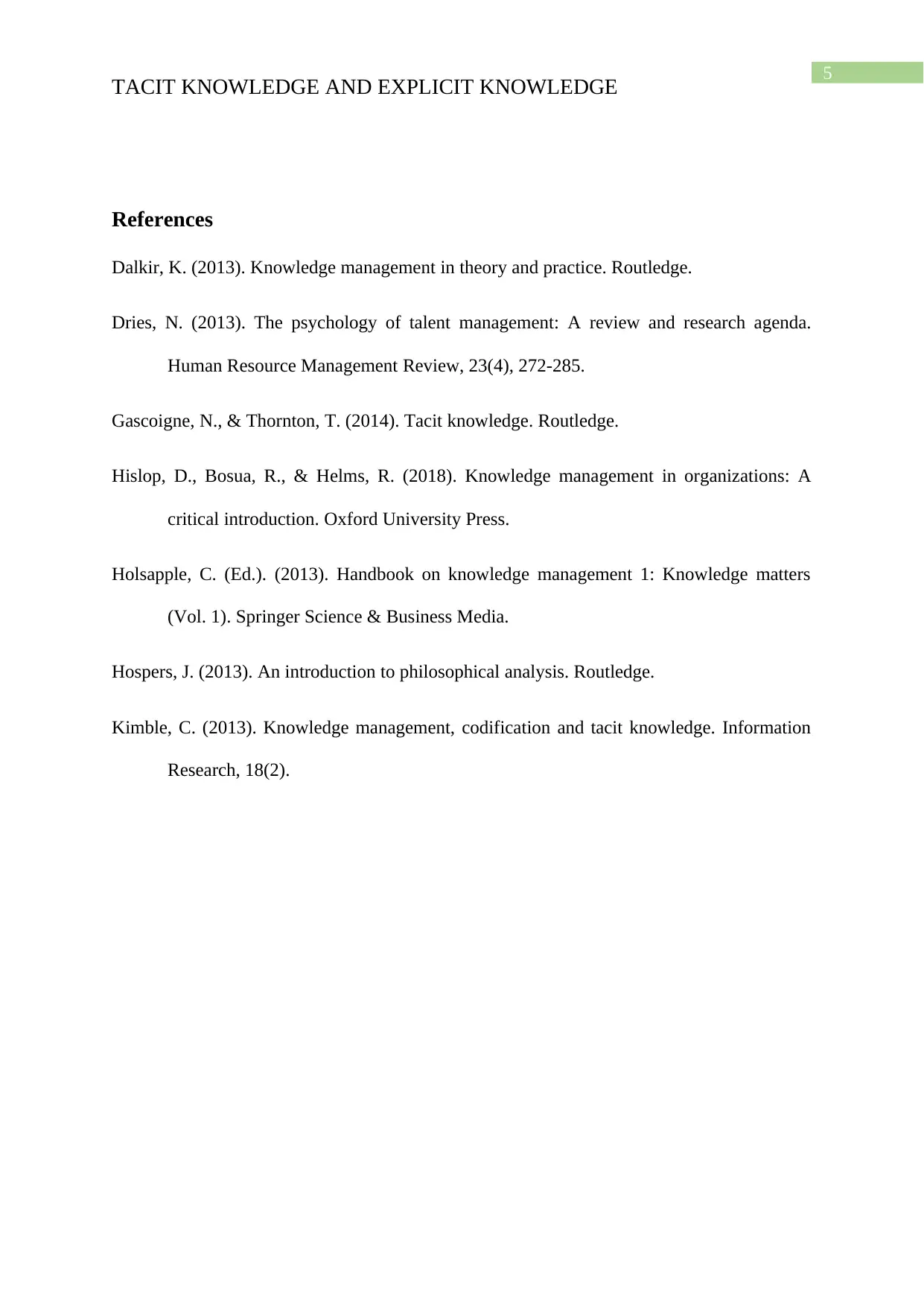
5
TACIT KNOWLEDGE AND EXPLICIT KNOWLEDGE
References
Dalkir, K. (2013). Knowledge management in theory and practice. Routledge.
Dries, N. (2013). The psychology of talent management: A review and research agenda.
Human Resource Management Review, 23(4), 272-285.
Gascoigne, N., & Thornton, T. (2014). Tacit knowledge. Routledge.
Hislop, D., Bosua, R., & Helms, R. (2018). Knowledge management in organizations: A
critical introduction. Oxford University Press.
Holsapple, C. (Ed.). (2013). Handbook on knowledge management 1: Knowledge matters
(Vol. 1). Springer Science & Business Media.
Hospers, J. (2013). An introduction to philosophical analysis. Routledge.
Kimble, C. (2013). Knowledge management, codification and tacit knowledge. Information
Research, 18(2).
TACIT KNOWLEDGE AND EXPLICIT KNOWLEDGE
References
Dalkir, K. (2013). Knowledge management in theory and practice. Routledge.
Dries, N. (2013). The psychology of talent management: A review and research agenda.
Human Resource Management Review, 23(4), 272-285.
Gascoigne, N., & Thornton, T. (2014). Tacit knowledge. Routledge.
Hislop, D., Bosua, R., & Helms, R. (2018). Knowledge management in organizations: A
critical introduction. Oxford University Press.
Holsapple, C. (Ed.). (2013). Handbook on knowledge management 1: Knowledge matters
(Vol. 1). Springer Science & Business Media.
Hospers, J. (2013). An introduction to philosophical analysis. Routledge.
Kimble, C. (2013). Knowledge management, codification and tacit knowledge. Information
Research, 18(2).
⊘ This is a preview!⊘
Do you want full access?
Subscribe today to unlock all pages.

Trusted by 1+ million students worldwide
1 out of 6
Related Documents
Your All-in-One AI-Powered Toolkit for Academic Success.
+13062052269
info@desklib.com
Available 24*7 on WhatsApp / Email
![[object Object]](/_next/static/media/star-bottom.7253800d.svg)
Unlock your academic potential
Copyright © 2020–2026 A2Z Services. All Rights Reserved. Developed and managed by ZUCOL.





